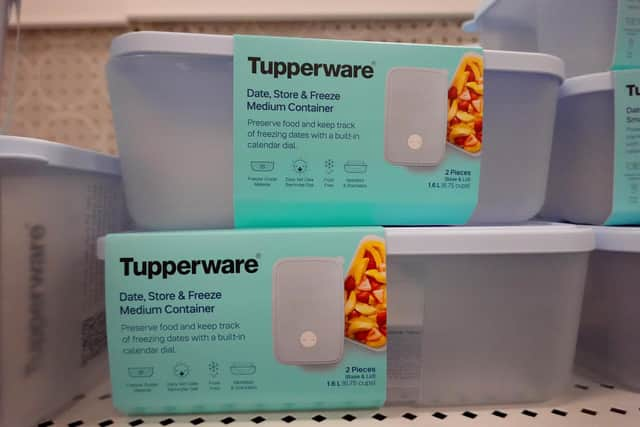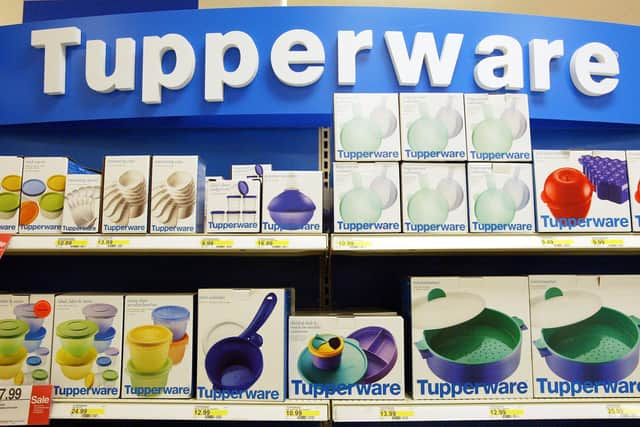Analysis: do Tupperware's financial woes mean it will become forever out of date - or does it still have a fresh future?
But now, the historic, US-based business, whose products have been used by top royalty at Buckingham Palace and has helped NASA grow vegetables in space, is in danger of going bust – saying it is pursuing investors to keep it afloat and is in danger of being delisted by the New York Stock Exchange.
Shares in Florida-based Tupperware Brands stumbled in the wake of reporting its difficulties, with the increased cost of borrowing and "volatility" in its earnings meaning it "may not have adequate liquidity” in the short term. "The company has therefore concluded that there is substantial doubt about its ability to continue as a going concern”, it told US shareholders.
Advertisement
Hide AdAdvertisement
Hide AdDespite a resurgence during the pandemic as people stayed at home and cooked for themselves, the position in which the firm now finds itself marks a fall from its heyday after being developed nearly 80 years ago by Earl Tupper in Massachusetts. The chemist realised while creating moulds at a plastics factory after the Great Depression that an airtight seal for plastic storage containers like those on a paint can would save families money on expensive food waste. “This signature container, which is still sold, helped to create the food storage category we know and love today, revolutionising the way the world stores, serves and prepares food,” the firm says.


Tupperware parties were a key driver of its growth, a concept popularised by saleswoman Brownie Wise, and such a marketing scheme was later emulated by brands such as make-up firm Avon, and Ann Summers when the late Jacqueline Gold took the reins.
Strategy
But George Shepherd, a branding expert and lecturer in creative advertising at Edinburgh Napier University, told The Scotsman that Tupperware’s famous “1960s and ‘70s suburban parties” were an innovative marketing strategy at the time but a concept with “little resonance nowadays” – a view echoed by James Rimmer, a consultant at Expense Reduction Analysts.
He told The Scotsman that currently Tupperware “is an example of a business with a strong brand and history not being able to adapt to changing consumer demands, [one] that was built for times when we had no fridges and plastic was novel – fast-forward to today and consumers don't want products made of plastic, they want innovation”.


It is seen as having had its sales eaten away by factors such as similar and cheaper products put on the shelves by rivals (a four-piece set of Tupperware fridge storage containers costs more than £90 at the recommended retail price, with a six-piece costing up to around £120), while its brand name has, like Hoover for example, become synonymous with any type of similar product regardless of who made or sold it.
Prior to the pandemic resurgence, Tupperware had negative sales growth for three consecutive years, according to FactSet, and last month it posted a 24 cents-per-share loss for the fourth quarter, rattling investors who were expecting a profit of 22 cents. Sales climbed to just over $300 million (£241m) in the period, having fallen from nearly $500m in the same quarter of 2020.
Miguel Fernandez, president and chief executive at Tupperware Brands, said alongside the latest results: "2022 was a true test of our resolve to turn around this company and expand consumer access to our iconic brand in markets all around the world. We entered the year optimistic about our progress in improving our business economics and executing on our growth plans. Events did not unfold in our favor, so we reacted quickly to the challenges."
Finances
The firm last week received a non-compliance notice from the NYSE for failing to file its annual results with the Securities and Exchange Commission, and has six months from the filing due date to regain compliance, though the stock exchange can begin the process of delisting it at its own discretion.
Advertisement
Hide AdAdvertisement
Hide AdNow, Tupperware has stated that it is considering selling some property holdings and other non-core assets to free up cash, while Chasen Bender, an analyst with Citi, said its creditors appear to be giving it a 30-day grace period until a certain financial performance report is filed. He added that even though the business says it is working toward finalising the filing, "the path forward appears highly uncertain".
However, looking at its legacy, academic Alison Clarke, author of Tupperware: The Promise of Plastic in 1950s America, has been quoted saying its party concept was a rare source of flexible employment for housewives. She added: "I started off thinking it was an exploitative capitalist conspiracy against women, and then I met [many] who had a fantastic life because of it and saw how it was empowering for them."
Tupperware finance boss Mariela Matute in March outlined efforts to boost the firm’s financial position in the fourth quarter – such as raising prices to protect gross margins. “While we are pleased with these positive initiatives, we expect 2023 to be a transition year, as we work to stabilise the business and solidify our financial foundation."
However, this year now looks set to be even more pivotal for the brand that previously imagined as its future hangs in the balance. Mr Shepherd, who is also the co-founder of advertising and marketing consultancy Red Spider, believes Tupperware’s chances of survival are “50:50 – being bought by the likes of [US retail giant] Walmart would be its only hope, I think”.
Comments
Want to join the conversation? Please or to comment on this article.